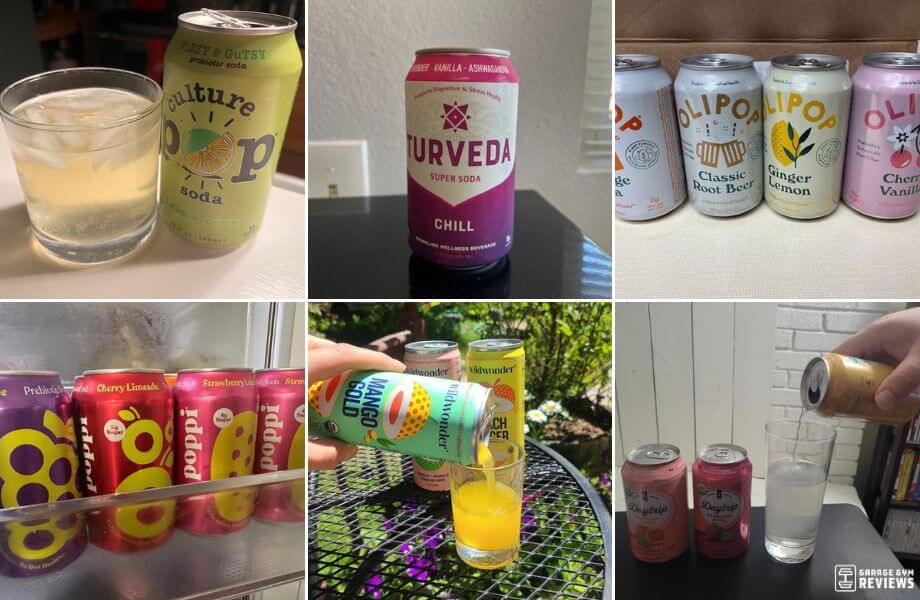We test and review fitness products based on an independent, multi-point methodology. If you use our links to purchase something, we may earn a commission. Read our disclosures.
As you may imagine, when we asked our team to test out some of the best prebiotic soda available on the market, they were excited to switch things up after weeks of trying supplements like greens powders. Prebiotic sodas have taken TikTok by storm as a healthier version to traditional sodas because they may help support a healthier gut with ingredients like botanicals and healthy fibers.
Now, as a registered dietitian nutritionist, I would be remiss if I didn’t emphasize that we shouldn’t rely on fancy sodas to support our gut and digestive health. While they garner a lot of likes with the young ones on social media (after all, a “healthy soda” isn’t a hard sell), they’re still sodas. That said, these drinks can have a place in your wellness routine, so we wanted to find and try the most popular brands on the market today.
Our product testers include certified nutrition coaches and certified personal trainers, and they tested each of the prebiotic sodas on this list. After testing multiple brands and flavors, they rated the sodas on factors such as:
- Formulation: How much fiber does a can of soda have? Is it low in added sugar?
- Taste: Did the sodas come in a wide range of flavors, and were they enjoyable to drink?
- Mouthfeel and carbonation: Was it similar to drinking another carbonated beverage, or was the texture totally different?
- Side effects: Did our testers experience any negative side effects after drinking the sodas?
Medical disclaimer: This article is intended for educational and informational purposes only. It is not intended as a substitute for medical advice. For health advice, contact a licensed healthcare provider.
Best Prebiotic Sodas
- Best Prebiotic Soda Overall: OLIPOP
- Best-Tasting Prebiotic Soda: wildwonder Sparkling Probiotic Juice Drink
- Best Healthy Prebiotic Soda: Daytrip Organic Prebiotic Soda
- Best Prebiotic Soda Without Stevia: Turveda
- Best Probiotic Soda: Culture POP
- Best Budget Prebiotic Soda: poppi
Best Prebiotic Soda Overall: OLIPOP
Good for: Those looking for a soda with a potent formulation
Best Overall
OLIPOP Prebiotic Soft Drink
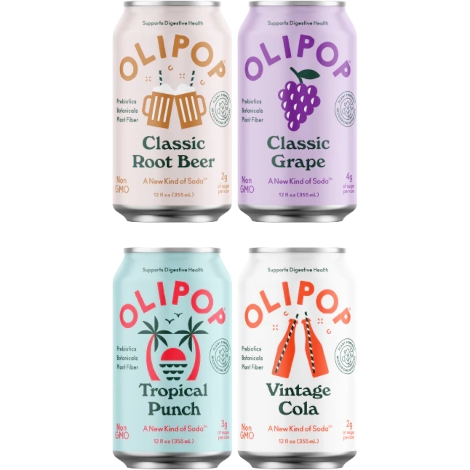
Product Highlights
- Plant-based soda alternative with a high fiber content
- Listed benefits: Supports microbiome and digestive health
- Available in 17 flavors
Pros & Cons
Pros
- 45-day money-back guarantee
- Paleo, vegan, gluten-free, and non-GMO
- 17 different flavors
- Subscribe and save 15%
- Variety packs available
- Available in-store at places like Target, Walmart, and grocery stores
Cons
- More expensive than traditional sodas
- Most flavors require refrigeration (shelf-stable flavors are limited)
- Contains stevia, which some individuals may prefer to avoid
- Uses a proprietary blend that does not disclose the quantities of ingredients included
Bottom Line
OLIPOP is a prebiotic soda meant to help you replace your traditional soda with a healthier option. The soda is generally positively reviewed, though some negative reviews complained about the price making it too expensive to purchase regularly. Some customers disliked the taste and noted an aftertaste.
OLIPOP is a prebiotic soda that claims it tastes like the soda you grew up drinking while providing actual health benefits. OLIPOP wants people to know that you can indulge your craving for sweets without sacrificing health by including plant fiber, prebiotics, and botanicals in their drinks.
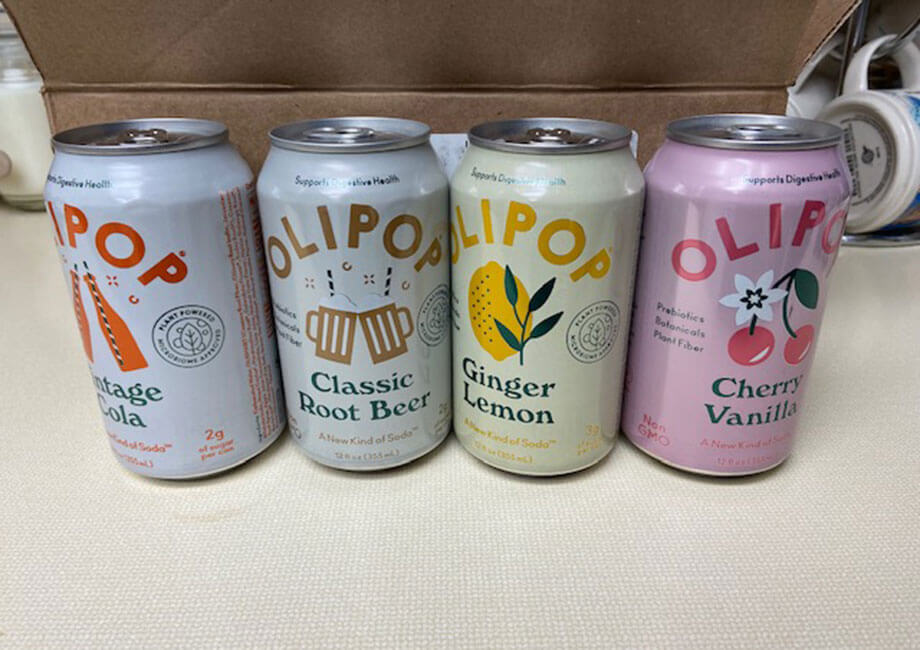
GGR Senior Editor Erin Chancer, NASM-CNC, ISSA-CPT, tested OLIPOP and gave it a 4 out of 5 for taste. “I love root beer and the OLIPOP version of root beer is passable, but not quite up to par,” Erin remarked. “The fruit options aren’t bad, though they had sort of a ‘perfume’ flavor.”
While our tester didn’t love the taste of the OLIPOP flavors she tried, we do like that it has a large quantity of diverse prebiotic fibers, particularly chicory root. Chicory root contains a type of fiber called inulin, which studies have shown has a direct effect on the growth of beneficial bacteria in the gut1.
That said, the taste is likely so-so because OLIPOP doesn’t contain any high-fructose corn syrup, artificial sweeteners, colors, or flavors. So, if anything, it could be a healthier alternative to soft drinks when making your evening mocktails.
As far as mouthfeel and carbonation, Erin awarded OLIPOP a rating of 5 out of 5. “The mouthfeel was pretty close to sparkling water or a seltzer,” she said. She also gave a rating of 4 out of 5 for side effects, noting, “I didn’t feel any physical side effects outside of just disliking a few of the soda flavors.”
We also want to make sure to bold and circle the fact that the Vintage Cola and Cherry Cola flavors contain 50 milligrams of caffeine from green tea. This isn’t a ton, but if you plan on chugging these babies all day to stay hydrated, it’s something to be aware of.
RELATED: Hydration for Runners
| Serving size | 1 can (355 mL) |
| Calories per serving | 35-45 |
| Total sugar per serving | 2-5 g |
| Added sugars | 2-5 g |
| Prebiotics/probiotics per serving | 9 grams of fiber; cassava root, chicory root, Jerusalem artichoke, nopal cactus, calendula flower, kudzu root, marshmallow root, acacia fiber, guar fiber |
| Contains caffeine? | Yes, Vintage Cola and Cherry Cola have 50 mg each |
Best-Tasting Prebiotic Soda: wildwonder Sparkling Probiotic Juice Drink
Good for: People looking for something comparable to kombucha with a better flavor
Best-Tasting
wildwonder Sparkling Probiotic Juice Drink
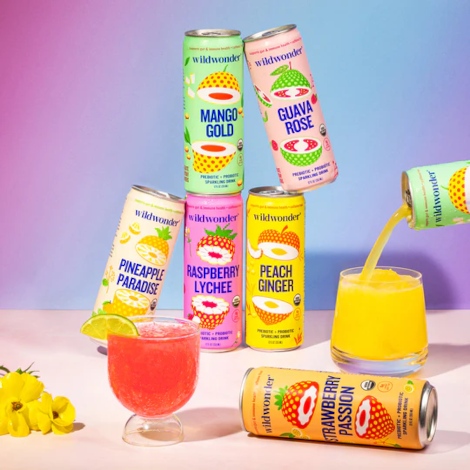
Product Highlights
- Sparkling juice featuring both prebiotics and probiotics
- Features 1 billion probiotics and 5 g of fiber
- Listed benefits: Improved energy, mood, metabolism, and cognitive function and decreased stress and bloating
- Women-owned business
- Featured on Shark Tank
- 9 flavors available
Pros & Cons
Pros
- Contains both prebiotics and live probiotics
- Numerous variety packs available
- Available to purchase in a 12-, 24-, or 36-pack
- 9 different flavors available
- 5% of profits go toward empowering women and marginalized communities
- Vegan, non-GMO, and certified organic
Cons
- Expensive at over $3 per can
- Mixed reviews on taste
- Limited in-store availability
Bottom Line
Wildwonder is a sparkling drink with both prebiotics and probiotics. These drinks are designed to improve energy, mood, metabolism, and brain function while helping to decrease stress and bloating. The reviews on taste are mixed. Multiple customers complained of the high price as well.
Wildwonder is a woman-owned brand that’s been featured on the hit show “Shark Tank.” In her pitch, founder Rosa Li described it as having “kombucha benefits without the vinegary taste or refined sugar.” It’s also marketed as the world’s first sparkling beverage with both prebiotics and probiotics.
The beverage comes in Peach Ginger, Mango Gold, and Guava Rose flavors on Amazon, but there are many more flavors available on the official website. Of the flavors offered on Amazon, Frieda tried them all and awarded an impressive 4.5 out of 5 which is why wildwonder earned the spot of the best-tasting soda on this list.
RELATED: Best Weight Loss Supplements for Men
GGR Editor Frieda Johnson, NASM-CNC, ISSA-SET, tested wildwonder and reported, “I really liked these! The Guava Rose was good, but did have too strong of a rose flavor for me. Mango Gold, which contains turmeric, was also pretty good. However, my favorite was the Peach Ginger. Basically, they all taste the way they are labeled without any weird aftertaste like you get with traditional sodas that contain stevia or Splenda.”
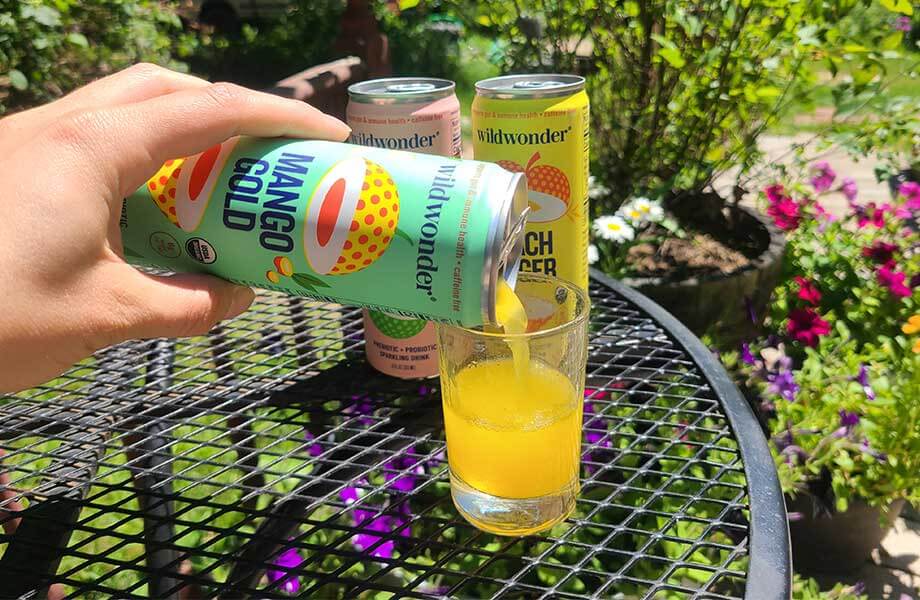
Frieda gave wildwonder a 5 out of 5 for mouthfeel and carbonation. “I don’t drink a lot of soft drinks, or any carbonated drinks for that matter, but these feel pretty similar,” she commented. She also didn’t experience any negative side effects like bloating or gastrointestinal distress, so we gave wildwonder a 5 out of 5 for side effects.
There are only two types of prebiotic fiber in wildwonder drinks: Jerusalem artichoke and chicory root inulin. It does contain probiotics in the form of Bacillus subtilis, but there isn’t a ton of reliable research on the health benefits of this strain.
That said, existing studies show it is often used as a treatment for children and older adults suffering from diarrhea. Supplementing with the beneficial bacteria has been shown to help ease gastrointestinal pain and promote smoother digestion2.
RELATED: Super Greens Powder Benefits
All things considered, wildwonder is a good low-calorie alternative to traditional sodas with only 6 grams of sugar. Also, given its content of probiotics, it may even be a better-tasting alternative for kombucha for those who can’t get behind the flavor of the fermented drink.
| Serving size | 1 can (355 mL) |
| Calories per serving | 35 |
| Total sugar per serving | 6g |
| Added sugars | 5g |
| Prebiotics/probiotics per serving | 5 g fiber; 1 billion probiotics; Jerusalem artichoke; and chicory root inulin |
| Contains caffeine? | No |
Best Healthy Prebiotic Soda: Daytrip Organic Prebiotic Soda
Good for: Those looking for an uplifting soda with a light flavor
Best Healthy
Daytrip Prebiotic Soda
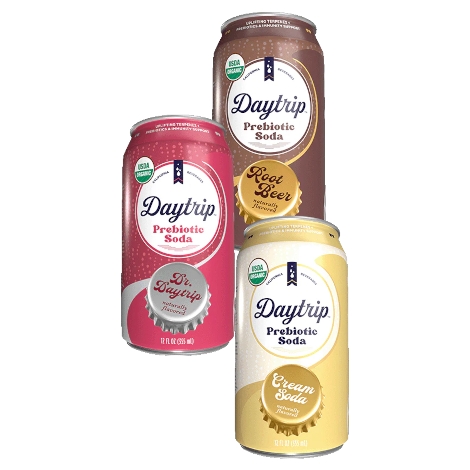
Product Highlights
Pros & Cons
Pros
- Vegan, gluten-free, and USDA organic
- No artificial ingredients
- Keto-friendly
Cons
- Only 6 flavors
- More expensive than traditional sodas
- Limited customer reviews
- Uses a proprietary terpene blend
Bottom Line
Daytrip Prebiotic Soda is a healthier version of traditional soda that features 5 grams of prebiotics from agave and 5 grams mood boosting terpenes blend. There are very limited customer reviews but some customers noted some of the flavors were closer to sparkling water than soda.
Daytrip is a California-based brand founded in 2019. It gets its name from its content of terpenes, which are known their mood-lifting effects. Before you balk, though, know that while terpenes may have uplifting, psychoactive effects similar to THC, terpenes and cannabinoids are not the same. Thus, these drinks contain zero THC.
The main prebiotic fiber in this soda is agave inulin, which is used as a natural sweetener just like agave syrup. The main differences between agave inulin and agave syrup are the chemical structure and the health benefits.
Studies have shown that ingestion of agave inulin can change the population of beneficial microorganisms in the gut of healthy adults3. However, more research is needed to confirm that this change directly translates to better digestive health.
GGR Senior Staff Writer Caine Wilkes, OLY, USAW-L1, rated the taste a 4.5 out of 5 after trying the fruit flavor variety pack. “I was pretty impressed with the flavor,” he reported. “It’s a little bit of sweet with a dash of fruity—flavorful and light.
“That said, sometimes all the flavors start tasting similar, probably because they are all sweetened with agave,” Caine continued. “However, I was still able to distinguish some distinct flavors from each beverage.”
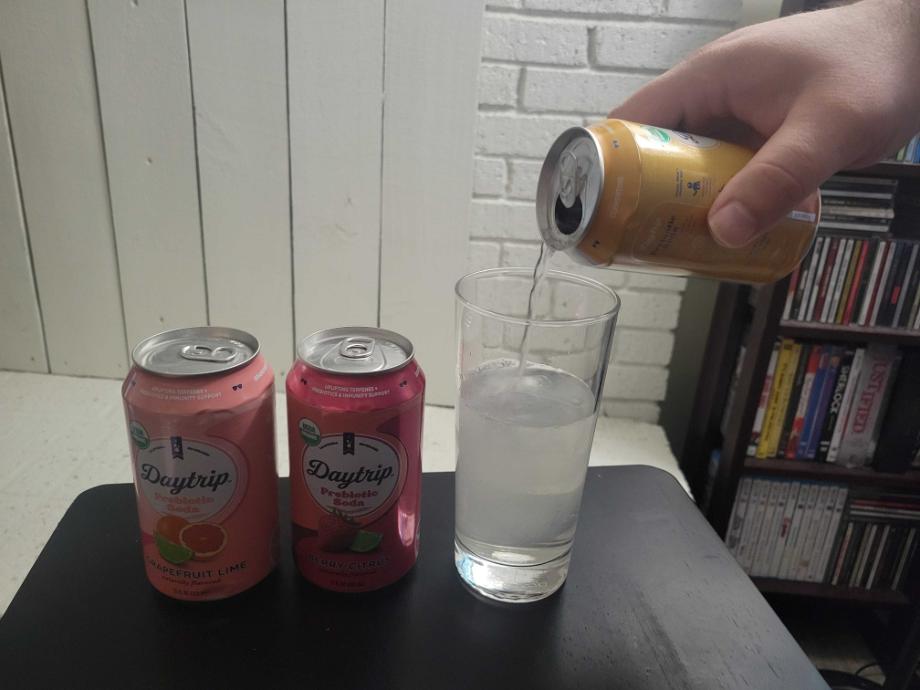
RELATED: Pedialyte Sport Drink Review
Caine gave Daytrip a 5 out of 5 for mouthfeel and carbonation, saying, “Doesn’t feel quite as carbonated as most sodas, but the whole drink is light overall. It’s comparable to a sparkling water that’s been lightly sweetened.” He also experienced no side effects, so Daytrip received a 5 out of 5 in that category.
We named Daytrip the healthiest due to its fiber content and overall use of natural ingredients. It’s also organic, vegan, and gluten-free and is fortified with at least 100% of your daily value of Vitamin C. However, it does have 12 grams of sugar from cane sugar and the agave.
| Serving size | 1 can (355 mL) |
| Calories per serving | 30-60 |
| Total sugar per serving | 13 g |
| Added sugars | 12 g |
| Prebiotics/probiotics per serving | 5-7 g of fiber; agave inulin |
| Contains caffeine? | No |
Best Prebiotic Soda Without Stevia: Turveda
Good for: Those avoiding added sugars and/or who don’t like the taste of stevia
Best Without Stevia
TURVEDA Prebiotic Super Soda
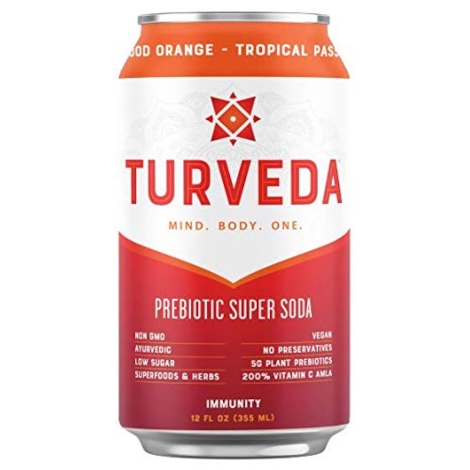
Product Highlights
- Vegan soda alternative featuring prebiotics, super herbs, and adaptogens
- All varieties support digestive health
- Some flavors also support immunity and may reduce feelings of stress
- Three flavors with three functions: Immunity, Chill, and Wellness
Pros & Cons
Pros
- Vegan and non-GMO
- No preservatives
Cons
- More expensive than traditional sodas
- Only three flavors
- Extremely limited customer reviews
- Very limited in-store availability
- No variety pack with all flavors
Bottom Line
TURVEDA is a vegan prebiotic soda available in three flavors, each with a different targeted benefit: immunity, chill, or wellness. There are extremely limited customer reviews for this product.
This “prebiotic super soda” got its start when a student teamed up with his gastroenterologist father to construct a healthier soda for the gut and mind. Turveda stands out not just for its lack of stevia, but also for its inclusion of adaptogens along with prebiotics.
For instance, its “chill” drinks contain ashwagandha. Its “wellness” versions contain cordyceps mushroom extract, plus antioxidants like turmeric and ginger. All of the sodas are sweetened with monk fruit juice.
Turveda was tested by Matt Dustin, CES, PN1-NC, staff writer at GGR who was not a fan of the flavor, so he gave a rating of 2 out of 5. “I had Chill, which contains lavender, vanilla, and ashwagandha,” Matt says. “The aftertaste was very strong with a prominent lavender and herbal flavor that made it very difficult to finish.”
RELATED: Nutricost Ashwagandha Gummies Review
He did give a 4 out of 5 for mouthfeel and carbonation. “It has a comparable texture to soda,” he said. He also rated Turveda a 5 out of 5 for side effects, as he didn’t experience anything negative with the exception of not enjoying the flavor.
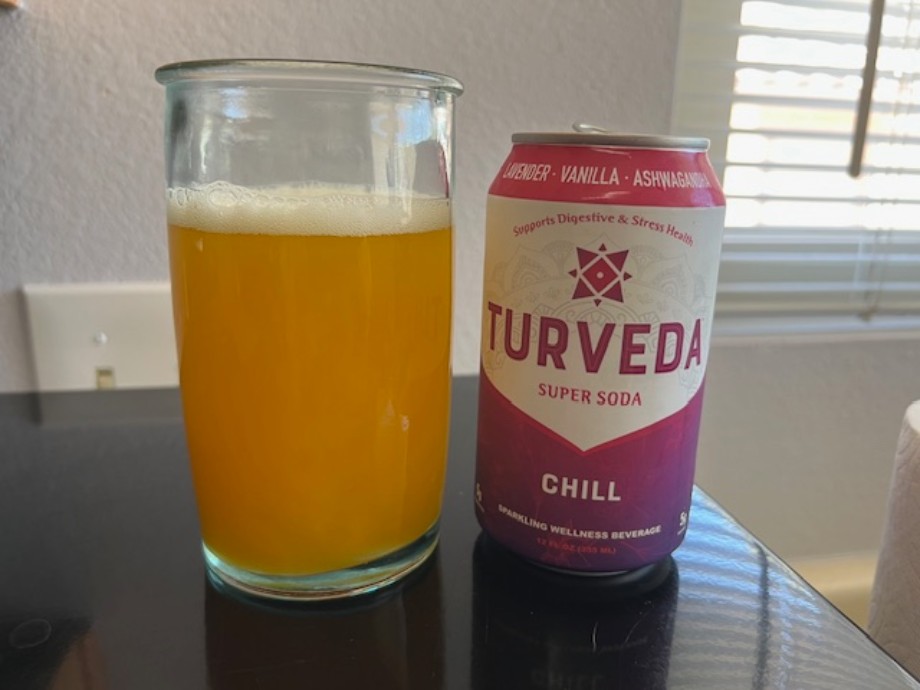
The good news is that Turveda is the first brand on our list to have zero added sugars. This is great for those with conditions like diabetes who may want to enjoy a flavorful drink while still keeping blood sugar under control. Each Turveda soda also prominently features ginger, a compound that’s been shown to help promote better digestive health and reduce bloating in the gut4.
| Serving size | 1 can (355 mL) |
| Calories per serving | 40 |
| Total sugar per serving | 5 g |
| Added sugars | 0 g |
| Prebiotics/probiotics per serving | 5 g of fiber; chicory root fiber |
| Contains caffeine? | No |
Best Probiotic Soda: Culture POP
Good for: Individuals looking for a drink with live cultures rather than fiber
Best Probiotic Soda
culture POP Soda Prebiotic Drink
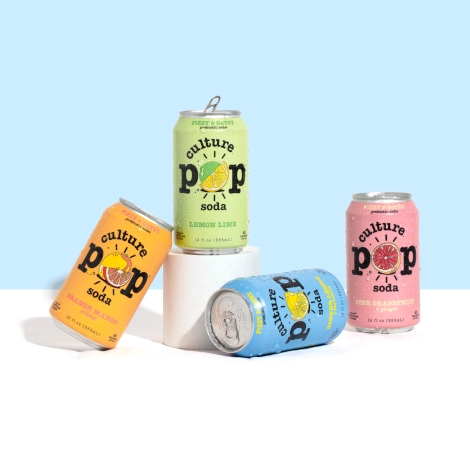
Product Highlights
- Caffeine-free probiotic soda made with fruit juice, spices, and herbs
- Listed benefits: Supports digestion, gastrointestinal balance, and immunity
- 8 available flavors
Pros & Cons
Pros
- Vegan, kosher, gluten-free, and certified non-GMO
- Sampler pack with at least 1 of every flavor available
- Free shipping on US-based orders
- Shelf-stable and does not need to be stored in a fridge
Cons
- More expensive than traditional sodas
- Only 8 flavors
- Customers noted poor packaging led to damaged cans when ordering from the company website
- Limited in-store availability
Bottom Line
Culture POP Soda is a probiotic alternative to traditional sodas that claims to support gut health by including the probiotic Bacillus subtilis. There were mixed reviews on the taste, with multiple customers noting it was more similar to sparkling water than soda.
Culture POP gets its name from its content of live cultures. Though this drink doesn’t have any prebiotic fibers, it does contain billions of colony-forming units (CFUs) of beneficial microorganisms. Culture POP also says it is shelf-stable, as its probiotics can remain viable when stored at room temperature. You can store these babies in your pantry, in your bag, or even your car.
We had Culture POP tested by Lauren Strong, CPT, senior staff writer at GGR. She gave Culture POP a 4.5 out of 5 for taste. “The flavor was semi-sweet, refreshing and light—I thought it was great,” Lauren said. “I also totally love the bitter taste of ginger, so the Ginger Lime flavor felt really great on my tastebuds.”
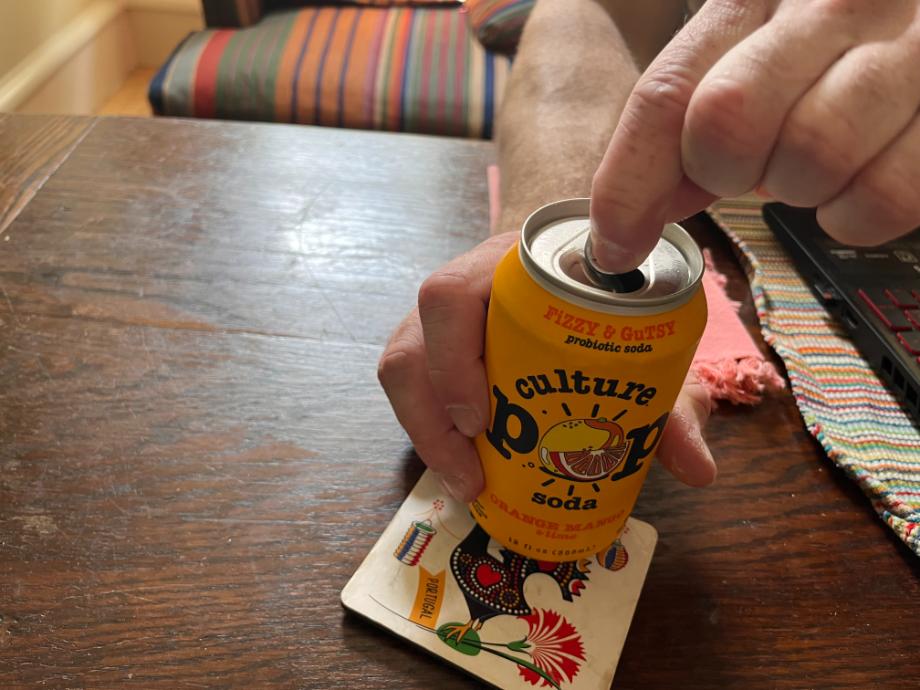
This would be a good time to mention that Culture POP is naturally sweetened with fruit juice and contains no added sugars or stevia. If you’ve ever had a sparkling water like Spindrift, then you’re familiar with the idea. Lauren gave Culture POP a 5 out of 5 for side effects, as she experienced none.
Lauren also gave it a 5-out-of-5 rating for mouthfeel and carbonation, saying, “I’d compare it to drinking seltzer water and consider it a pretty good thing that it doesn’t give your throat this sticky-sweet feeling like regular soda does.”
RELATED: Best Probiotic Supplements
Culture POP won’t contribute to your fiber intake any time soon. Still, if you enjoy lightly sweetened sparkling water and want to try one that has that vibe plus some good bacteria, this is the brand for you.
| Serving size | 1 can (355 mL) |
| Calories per serving | 45 |
| Total sugar per serving | 8 g |
| Added sugars | 0 g |
| Prebiotics/probiotics per serving | Bacillus subtilis |
| Contains caffeine? | No |
Best Budget Prebiotic Soda: poppi
Good for: Those looking for a low-cost alternative to sugary soft drinks
Best Budget
poppi Prebiotic Soda
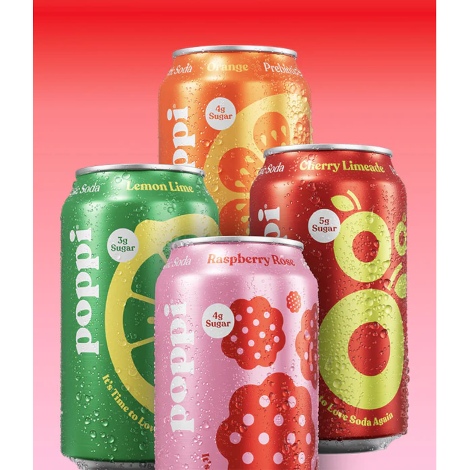
Product Highlights
- Available in 13 different flavors
- Features apple cider vinegar, fruit juice, and inulin prebiotics
- As seen on Shark Tank
Pros & Cons
Pros
- Shelf-stable and does not need to be refrigerated (though it’s recommended to serve chilled)
- Variety packs available
- Non-GMO Project Verified and Kosher certified
- More affordable than other prebiotic sodas
- Available in stores like Target, Publix, and Costco
- Vegan and gluten-free (though not certified for either)
Cons
- Only available in 12-packs
- In-store availability may vary by region
- Uses stevia, which some people may be sensitive to
- More expensive than traditional soda
- Mixed reviews on taste
Bottom Line
Poppi is billed as a healthier alternative to traditional sodas. Each soda contains fruit juice, prebiotics, and apple cider vinegar. It is more expensive than traditional soda and has very mixed reviews on taste. Some customers found it to be a good replacement for soda, while others found it undrinkable and didn’t finish the 12-pack they purchased.
We want to start off by acknowledging the ongoing lawsuit with poppi. The lawsuit alleges that the mere 2 grams of inulin prebiotic fiber isn’t enough to deliver the gut health benefits the soda claims to offer. That said, it’s still low enough in calories and sugar to be a healthier alternative to regular soft drinks, so we still wanted to give it a try.
We had GGR Head of Content Nicole Davis, CPT, PN1-NC, test poppi. She gave it a 4 out of 5 for mouthfeel and carbonation. “I didn’t find it had as much of a crispy texture as traditional soda, but that was totally fine with me,” Nicole said. She also had no side effects, so she gave a 5-out-of-5 rating there.
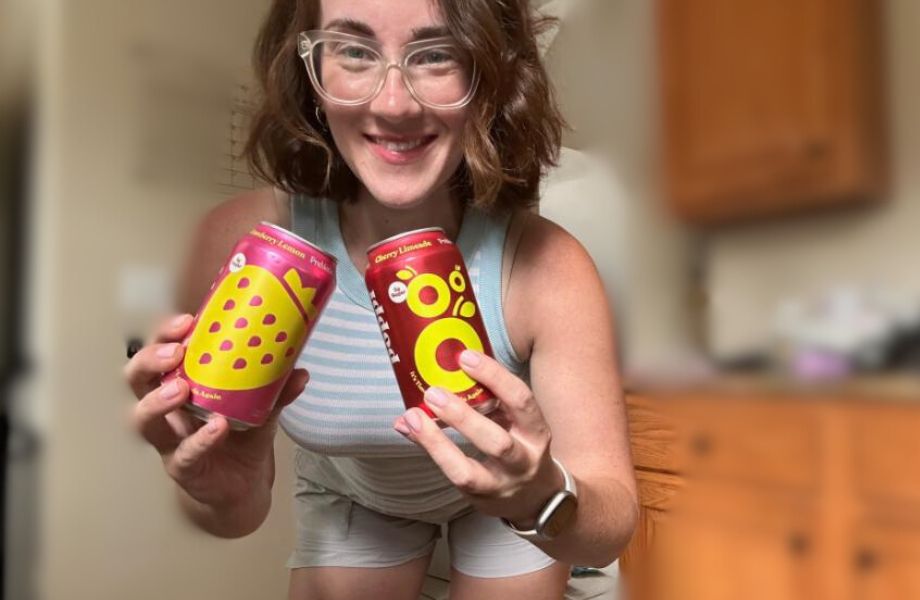
RELATED: Best Fiber Supplement
So, what about taste? Nicole thought Poppi earned a 4 out of 5 in that area. “I had the Strawberry Lemonade, Grape, Cherry Limeade, and Orange from the variety pack, and Orange and Strawberry Lemonade were definitely the winners,” Nicole reported.
“They aren’t overly sweet like traditional or diet soda and the acidity from the apple cider vinegar is definitely there, but it’s subtle,” she continued. “That said, I found them more flavorful than sparkling water, so they had a nice balance in that respect.”
| Serving size | 1 can (355 mL) |
| Calories per serving | 25 |
| Total sugar per serving | 5 g |
| Added sugars | 4 g |
| Prebiotics/probiotics per serving | 2 g of fiber, organic agave inulin |
| Contains caffeine? | No |
How We Picked and Tested the Best Prebiotic Sodas
As we were going through the different brands of prebiotic soda, we found some that were much better than others for various reasons. Here are some qualities of our chosen brands that earned them a spot on our list:
Presence of Caffeine
Colas like Coke are notorious for containing small amounts of caffeine, as they are made using kola nuts, which are a natural source of caffeine. Some prebiotic sodas come in flavors that are similar to Coke, but the ones we chose have little to no caffeine content. After all, these aren’t pre-workout drinks. They are beverages meant for casual consumption throughout the day, including in the evening.
RELATED: Best Stim-Free Pre-Workout
Calorie Content
One key feature of the prebiotic sodas we chose is that they are low in calories. None of them even crack 100 calories. The average 12-ounce can of traditional soda is 140 calories, all of which are empty. They deliver zero health benefits, which isn’t good when you could use those calories for whole foods that deliver actual nutrition.
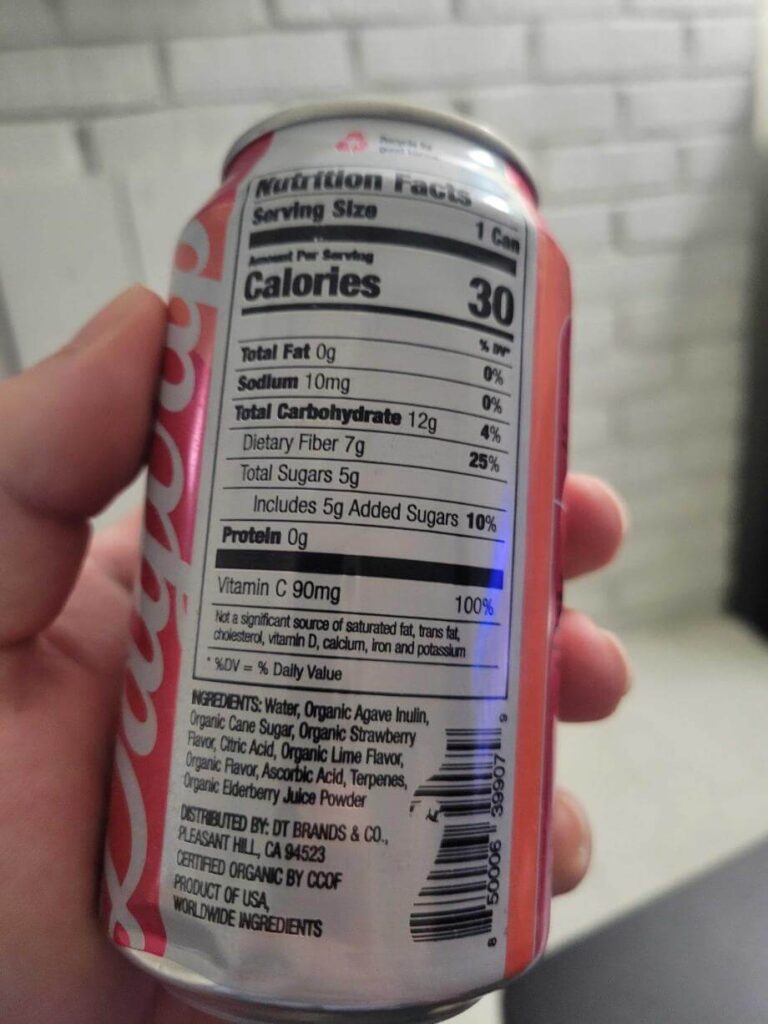
In addition, we tried to pick brands that are low in calories to cater to our fitness-conscious readers who may be watching their calories closely and appreciate drinks that don’t totally blow their daily calorie allowance.
RELATED: Best Weight Loss Programs
Finally, those looking for an alternative to diet soda, whether it’s because they don’t enjoy the aftertaste or just have an aversion to artificial sweeteners, can enjoy a prebiotic soda. Prebiotic sodas may not be zero-calorie, but they’re not huge calorie bombs, either.
Added Sugars
The presence of added sugars in prebiotic soda isn’t exactly a dealbreaker. At least some sugar can mask the flavor of bacteria, apple cider vinegar, or other health-promoting ingredients the soda contains.
However, an excessive amount of added, refined sugar isn’t a good feature. Considering we are drinking prebiotic soda for health, taking it along with something inflammatory like refined sugar defeats the purpose.
Furthermore, studies have shown that high intake of refined sugar causes inflammation in the gut that disrupts the gut microbiome in a way that makes it difficult for good bacteria to thrive5, thus negatively affecting gut health.
Flavor
Forget all the health talk and such—we also wanted to present sodas that tasted good. There are plenty of other ways to get your prebiotics, be it from supplements or a food source. So, why choose a foul-tasting prebiotic soda when you could just chew on a piece of raw jicama? That’s why we tried to pick brands that had flavors our team could sign off on.
What is Prebiotic Soda?
Right out of the gate, let’s not confuse probiotics with prebiotics. Probiotics refer to the live bacteria present in supplements and whole foods like kimchi, kefir, or Greek yogurt. There are also probiotics in kombucha, which is similar to a probiotic soda.
RELATED: Best Fiber Supplements for Constipation
Prebiotics are not bacteria, but fibers. The digestive system doesn’t fully break down these fibers after we eat them; instead, the fibers sit in the gut. While there, the bacteria in our gut feed on them for food, allowing them to grow, multiply, and thrive.
However, only certain types of fiber feed our good gut bacteria, which are associated with better health. These types of fibers are what we call prebiotics. Recently, these fibers have been added to soda to help support gut health and, viola, we have prebiotic soda.
While simply consuming this fiber doesn’t guarantee better gut health or even earn these drinks the label of “good for you,” it does help support the intake of more fiber, which is something most Americans need.
Recent research suggests that Americans, on average, only consume about 16 grams of fiber per day, when the recommended daily amount is 25 grams for women and 38 grams for men. So, we have a lot of work to do.
That said, any nutritionist will tell you not to rely on prebiotic soda to meet your daily fiber needs. Most of your fiber should come from healthy carbohydrates like whole grains, fruits, and vegetables. Some common sources of prebiotics are apples, bananas, Jerusalem artichokes, asparagus, oats, beans and garlic.
Benefits of Prebiotic Soda
Why even consider a prebiotic soda? It certainly isn’t as wallet-friendly as what you can find in your local vending machine, so what’s the incentive? Here are some solid reasons to try prebiotic soda:
It Supports a Healthy Gut Microbiome
It’s no question that prebiotic fiber can nourish your gut bacteria, which is the main appeal of these drinks. If you don’t have access to a food source of prebiotic fiber or just don’t care for artichokes and oats, then prebiotic soda can be a way to supplement your prebiotic intake for gut health.
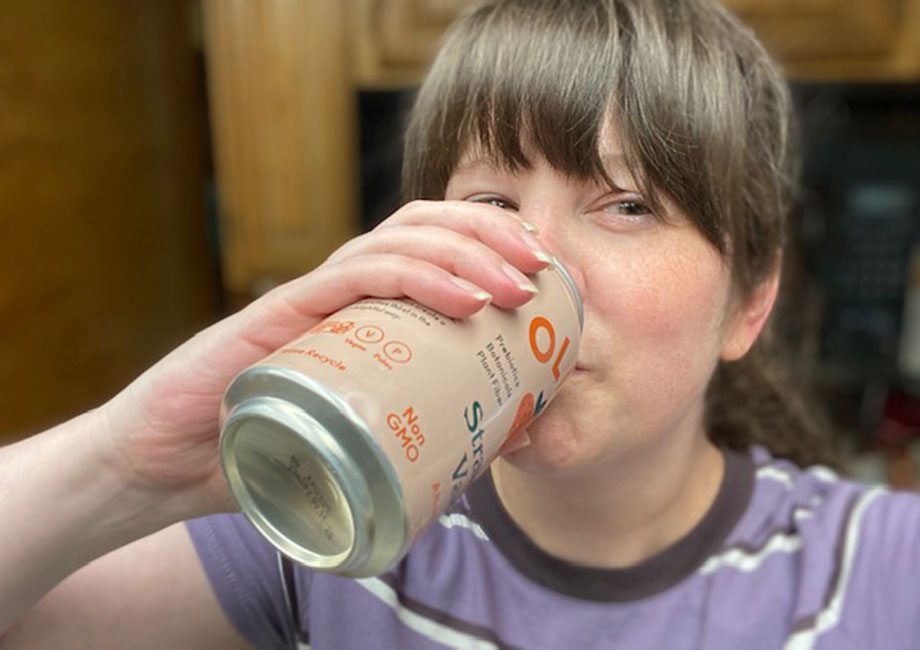
Remember, prebiotics work a lot better when also consumed with probiotic foods, so try to work both into your diet for best results.
It’s a Healthier Alternative to Soda
While we established that prebiotic sodas shouldn’t be your main source of prebiotic fibers, they are certainly a better alternative to traditional soda. Regular soda is high in calories, added sugars, artificial flavors, and colors—not to mention there’s not a nutrient in sight.
RELATED: What Is Erythritol?
So, prebiotic soda can be a better alternative. They give the same bubbly satisfaction you can use in mocktails or to just sip on during a hot day, but come with some potential health benefits that regular soda can’t offer.
It Encourages Fiber Intake
Getting in 25+ grams of fiber per day can be tough, especially for those who struggle with eating enough whole grains or produce. Now, it’s certainly not recommended that you try to meet your fiber needs from prebiotic soda alone. Not only would you lose out on a lot of nutrition by doing this, but you may also experience some serious GI distress.
That said, it can help contribute to your daily fiber needs if you have digestive issues, are looking out for your heart health, or just generally want to make sure you’re meeting your daily needs to optimize your wellness.
Dosing and Interactions
For the most part, prebiotic sodas are safe for healthy adults. However, excessive consumption of prebiotic fibers can have a laxative-like effect. They can also cause constipation, depending on the type of fiber ingested. Other side effects of too many prebiotics include gas, bloating, and stomach cramps.
This is especially true for those who already suffer from irritable bowel syndrome, as studies have shown that a higher intake of fiber can make symptoms of the disorder worse7.
Individuals who take certain medications also shouldn’t use products like prebiotic soda. Prebiotics may reduce the effectiveness of certain chemotherapy drugs used to treat cancer or immunosuppressant medications by blocking their absorption in the gut. If you take any prescription medications, check with your primary care physician and a registered dietitian to see which foods, supplements, and other products you should avoid.
RELATED: Athletic Greens Review
Finally, in some extreme cases, it’s been shown that ingesting 30+ grams of prebiotic fiber can increase one’s risk of liver damage and inflammation8. While this would require you to be pounding cans and cans of the stuff daily, it shouldn’t be underestimated how common it is for people to go overboard on what they consider to be a good thing.
Third-Party Testing
At GGR, we always recommend opting for wellness products that are third-party tested, especially by a recognized body such as NSF Certified for Sport or Informed Choice. That said, these tests are typically reserved for dietary supplements, like pre-workout.
All of the products on this list are beverages, so they technically fall under the jurisdiction of the Food and Drug Administration. The FDA, for all intents and purposes, has much stricter regulations in terms of what food and drinks they allow on shelves. Therefore, the lack of third-party testing doesn’t mean much for prebiotic sodas. The likelihood of their safety is extremely high, so you can rest easy.
Buying Guide: What to Look for in Prebiotic Sodas
Prebiotic sodas are a new product—as in, they just came on the scene within the last 5 years or so new. One can’t be blamed for not having a clue where to start when shopping for a good one. Luckily, we put together some criteria to give you a good place to start:
Fiber Content
The most important thing to look out for when shopping for prebiotic sodas is the fiber content. Just because a soda has prebiotics in it doesn’t mean it’s worth buying, as it might not have enough to actually feed the gut bacteria. Try to find a brand that contains at least 5 grams of fiber per serving.
Sugar Content
As mentioned, too much added sugar can have a detrimental effect on the gut microbiome by causing inflammation and an imbalance of good versus bad bacteria. Thus, look out for sodas with high quantities of added sugars.
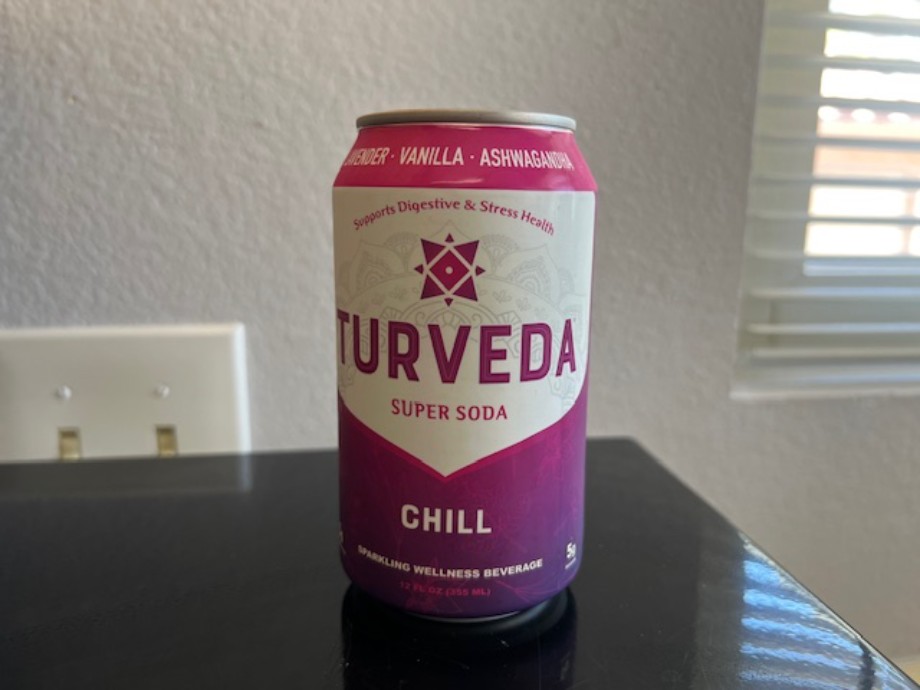
That said, be careful. “Sugar” and “added sugar” are two separate things and many labels now make the distinction on the back of the can. For example, a prebiotic soda may contain zero added sugar and use fruit juice as a sweetener instead, but the nutrition facts label will say the sugar content is high.
RELATED: Best Sugar-Free Protein Powder
The difference is that sugar from fruit doesn’t cause the same inflammation and gut damage we described with added sugar, so you don’t want to avoid something that is better for you. Therefore, read your labels carefully and check the label for added sugar ingredients like cane sugar, syrups, and nectars.
Price
If you plan on drinking these sodas regularly, make sure you don’t drink yourself out of house and home. When shopping, do a price comparison to see which ones fit your budget. Furthermore, if some products are pricier, check the fiber content and ingredients to ensure they are worth the price.
Brands that have a higher fiber content, contain other health-promoting compounds like adaptogens, or include several types of prebiotic fiber may be worth the extra money, as they may offer more benefits.
Caffeine
Some prebiotic sodas may contain caffeine, especially if they come in flavors similar to cola. If you are sensitive to caffeine, check the labels to see if the flavor you want contains any.
Customer Reviews
Many of these products are fairly new on the market, so you’re taking a gamble with buying something that doesn’t have much of a reputation. If you’re still on the fence, check out the customer reviews on Amazon of the brands you’re interested in.
Though you may not get reliable feedback on the health benefits, you can at least get a sense of how customers feel about the flavor and value of each prebiotic soda, which can help you make a more informed decision.
FAQs About Prebiotic Sodas
Are prebiotic sodas good for you?
Prebiotic sodas can be a good way to boost fiber intake and may provide many more benefits to the body than regular soft drinks.
Is Olipop or Poppi better for you?
OLIPOP has a higher content of prebiotic fibers, so it may be better for health than poppi.
Is OLIPOP really good for you?
OLIPOP is low in added sugars and contains 9 grams of fiber, so it is certainly a healthier alternative to real soda. This prebiotic fiber content may provide some health benefits.
These statements have not been evaluated by the Food and Drug Administration. This product is not intended to diagnose, treat, cure, or prevent any diseases.
References
- Vandeputte D, Falony G, Vieira-Silva S, et al. Prebiotic inulin-type fructans induce specific changes in the human gut microbiota. Gut. 2017;66(11):1968-1974. doi:10.1136/gutjnl-2016-313271
- Rui X, Ma SX. A retrospective study of probiotics for the treatment of children with antibiotic-associated diarrhea. Medicine (Baltimore). 2020;99(23):e20631. doi:10.1097/MD.0000000000020631
- Holscher HD, Bauer LL, Gourineni V, Pelkman CL, Fahey GC Jr, Swanson KS. Agave Inulin Supplementation Affects the Fecal Microbiota of Healthy Adults Participating in a Randomized, Double-Blind, Placebo-Controlled, Crossover Trial. J Nutr. 2015;145(9):2025-2032. doi:10.3945/jn.115.217331
- Nikkhah Bodagh M, Maleki I, Hekmatdoost A. Ginger in gastrointestinal disorders: A systematic review of clinical trials. Food Sci Nutr. 2018;7(1):96-108. Published 2018 Nov 5. doi:10.1002/fsn3.807
- Satokari R. High Intake of Sugar and the Balance between Pro- and Anti-Inflammatory Gut Bacteria. Nutrients. 2020;12(5):1348. Published 2020 May 8. doi:10.3390/nu12051348
- Quagliani D, Felt-Gunderson P. Closing America’s Fiber Intake Gap: Communication Strategies From a Food and Fiber Summit. Am J Lifestyle Med. 2016;11(1):80-85. Published 2016 Jul 7. doi:10.1177/1559827615588079
- Rau S, Gregg A, Yaceczko S, Limketkai B. Prebiotics and Probiotics for Gastrointestinal Disorders. Nutrients. 2024;16(6):778. Published 2024 Mar 9. doi:10.3390/nu16060778
- Kosmalski M, Frankowski R, Deska K, Różycka-Kosmalska M, Pietras T. Exploring the Impact of Nutrition on Non-Alcoholic Fatty Liver Disease Management: Unveiling the Roles of Various Foods, Food Components, and Compounds. Nutrients. 2023;15(13):2838. Published 2023 Jun 22. doi:10.3390/nu15132838
Further reading
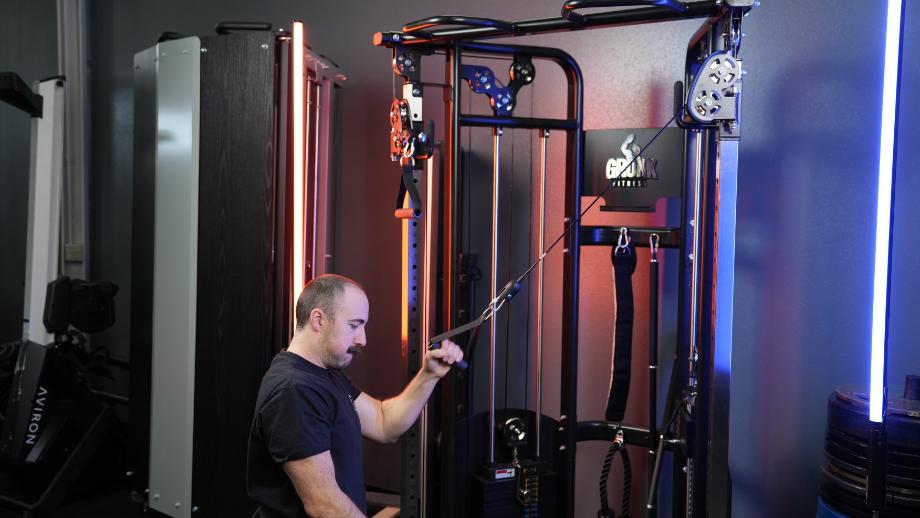
Rob Gronkowski and his brothers have a fitness equipment line? We’ll see how the equipment stacks up in this Gronk Fitness Functional Trainer review. Read more
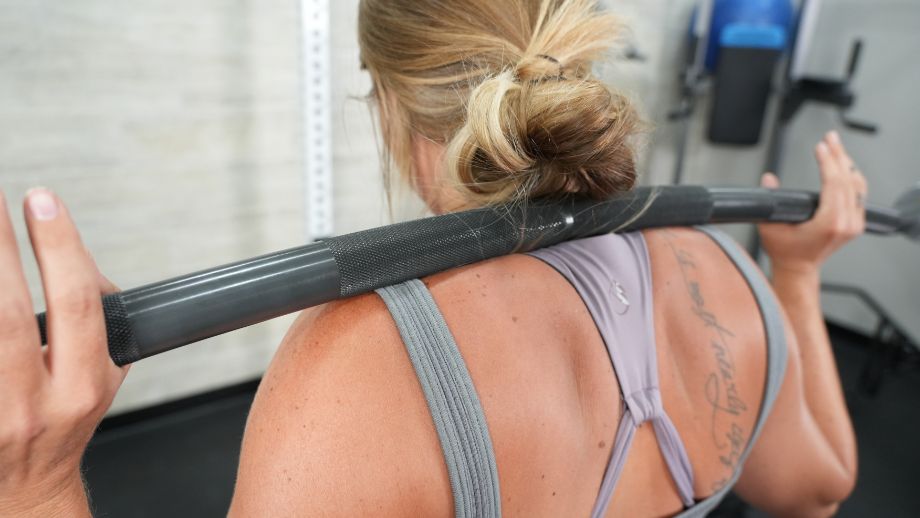
As you may imagine, when we asked our team to test out some of the best prebiotic soda available on the market, they were excited to switch things up after weeks of trying supplements like greens powders. Prebiotic sodas have taken TikTok by storm as a healthier version to traditional sodas because they may help support a healthier gut with ingredients like botanicals and healthy fibers.Now, as a registered dietitian nutritionist, » Read more about: Best Prebiotic Soda (2024): Support Your Gut in Bubbly Style » Read more
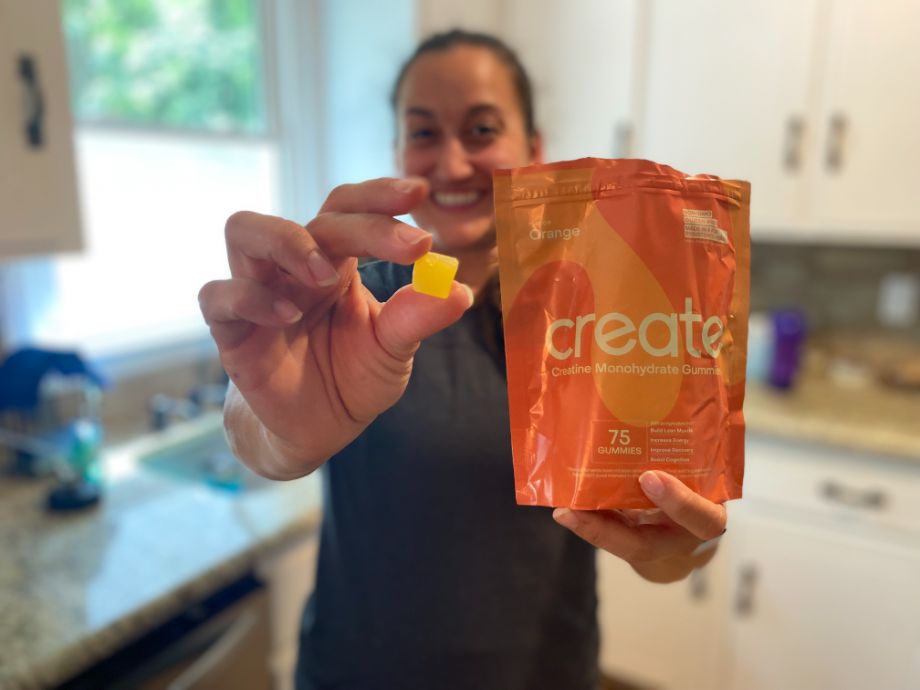
We’ve rounded up the best creatine gummies so you can get this powerhouse of a supplement in delicious candy form. Read more

Is this new Assault fan bike the best out there? Find out in our Assault Bike ProX review. Read more

